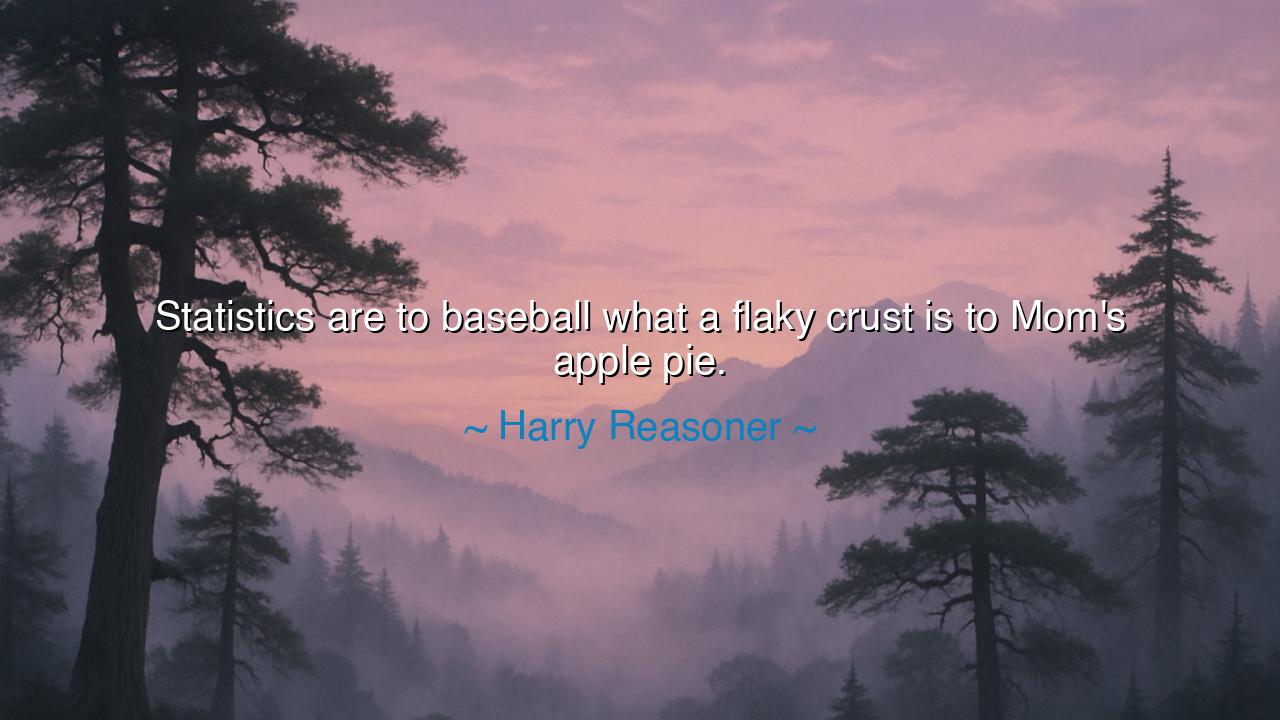
Statistics are to baseball what a flaky crust is to Mom's apple






When Harry Reasoner said, “Statistics are to baseball what a flaky crust is to Mom’s apple pie,” he was speaking not only as a journalist but as a philosopher of culture. On the surface, his words sparkle with humor — yet beneath them lies a deep reverence for the balance between science and soul, between precision and passion. Baseball, that most poetic of sports, thrives on numbers: batting averages, earned run averages, and home run counts. But Reasoner reminds us that statistics are not the game itself — they are its structure, its crust, holding together the tender, emotional core that makes the sport beloved. Just as an apple pie without its crust would collapse into sweetness without form, baseball without its statistics would lose the rhythm, the context, the frame that gives its moments meaning.
In the ancient world, the wise often spoke of harmony — of form and essence, of body and spirit united. Reasoner’s metaphor captures this timeless truth in modern language. The flaky crust is not the flavor of the pie; it is the vessel that brings the flavor to life. In the same way, statistics do not create the magic of baseball — they reveal it. They are the means by which the heart measures its joy, the record that preserves the moment of triumph or heartbreak long after the cheers fade. The game lives in emotion, but its legacy endures in numbers.
Baseball itself, born in the fields of 19th-century America, became a kind of national scripture, and its numbers — .406, 755, 56 — became verses in that sacred text. When Ted Williams batted .406 in 1941, it was not merely a number; it was perfection given form. When Hank Aaron hit 755 home runs, it was not arithmetic — it was endurance immortalized. Reasoner, in his poetic way, recognized that statistics transform fleeting moments into eternal memory, just as a pie’s crust transforms loose fruit into something lasting and whole. The essence of the game — the smell of grass, the crack of the bat, the rising arc of the ball — is ephemeral. But the statistics give it permanence, a place in the chronicles of time.
There is also a whisper of nostalgia in Reasoner’s words — the reference to “Mom’s apple pie” evokes not only sweetness, but home, belonging, and tradition. He reminds us that baseball, like that pie, is part of the cultural hearth — a symbol of comfort, continuity, and identity. The crust, carefully crafted, is the product of discipline and skill, just as the statistics of baseball are the result of careful observation and devotion to truth. Yet without the heart — without the apples, the sugar, the warmth — all the structure in the world would be meaningless. The union of both — structure and soul — is what makes beauty complete.
In ancient Greece, the philosopher Aristotle spoke of techne — the art of making, the craft that unites intellect and emotion. Baseball, and Reasoner’s reflection upon it, embody this same balance. The player’s swing is not just mathematics; it is instinct honed by repetition. The pitcher’s curveball is not only physics; it is artistry born from touch and timing. Likewise, the statistician’s ledger is not cold calculation but a kind of sacred archive, preserving the deeds of mortal men in eternal form. Reasoner’s quote celebrates this marriage of art and science, intuition and order, heart and mind.
From this truth arises a greater lesson: every great endeavor needs both heart and structure. A life guided only by passion may burn bright but fade swiftly; a life ruled only by numbers may endure but never inspire. Whether in art, sport, or daily labor, we must be both the baker and the mathematician — shaping form while preserving soul. The crust is nothing without the filling, and the filling is wasted without the crust. Perfection lies not in choosing one, but in blending both.
So, my listener, take this teaching as a compass for your own journey. In your work, cultivate precision; in your heart, nurture warmth. Build your life like Mom’s apple pie — sturdy in structure, tender in spirit. Let your dreams have form, your discipline have flavor. For in every craft — whether swinging a bat, composing a song, or raising a child — the true beauty lies not in what is counted, but in what is felt. Statistics may preserve the record, but love gives it meaning. And when both dwell together, the result — like the perfect pie — is timeless.






AAdministratorAdministrator
Welcome, honored guests. Please leave a comment, we will respond soon